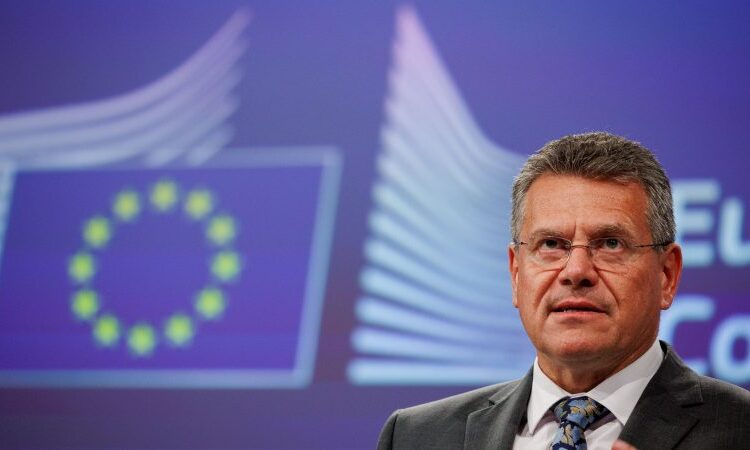The fifth EU-China high-level environment and climate dialogue, which took place in Brussels on 18 June, served to highlight Beijing’s concerns in the face of clean-tech trade restrictions and emphasise that agreement on climate finance would be crucial to make COP29 in Baku a success.
In 2023, it was the EU’s climate czar Frans Timmermans who made the long trip to Beijing to confer with Vice-Premier Ding Xuexiang for the fourth edition of the talks. The trip helped to pave the way for the COP28 climate conference, which was widely hailed as a success.
This year the Chinese came to town for the fifth iteration of the forum, against a backdrop of a brewing Brussels-Beijing trade conflict and the ongoing war in Ukraine.
Timmermans’ successor, Executive Vice-President Maroš Šefčovič – recently confirmed for his fourth term in the college of Commissioners – wants to build on last year’s momentum.
“It is important that we don’t lose track of what matters … the survival of the human race and maintaining a habitable planet,” he told the gathering of Brussels top-brass and the Chinese delegation.
Borrowing past language, Šefčovič stressed the traditional phrase that “green should stay the colour of [our] cooperation” in the official readout.
Tariffs loom large
Hours before the high-level meeting, a leading Chinese think-tanker made sure to stress Beijing’s displeasure in the face of the looming electric vehicle (EV) tariffs the EU plans to impose – and making a clear connection to global climate action.
“This new [EV] tariff, which I think is really unnecessary, is maybe a bit of a double standard,” said Huiyao Wang, president of the Center for China and Globalisation, addressing attendees of an event hosted by the European Policy Centre (EPC).
Delivering on lagging climate ambitions “according to the Paris Agreement” would require China producing clean technologies in a “cost-effective, reliable and efficient” manner, as well as other nations purchasing these Chinese goods, he said.
This conflict was not resolved in Tuesday’s dialogue. The official readout from the forum conceded that “there are areas where the EU and China do not see eye to eye.”
Climate finance
Their meeting is an important step on the circuitous route from Dubai, where COP28 was held, to Baku and COP29. Alongside updated climate goals, the question of climate finance looms large.
Both sides agreed on support for the Azerbaijani COP presidency’s focus on a new climate finance goal from 2025, the EU stated.
Europe has been at the forefront of efforts to coax Beijing to contribute to funding for poorer countries, which are struggling to finance the investment-heavy decarbonisation of their economies.
China, the world’s second-largest economy by nominal GDP, is currently exempt as it was classified as a “developing country” in 1992.
At a recent working-level climate meeting held in Bonn, Germany, the EU and other developed countries spent two weeks unsuccessfully looking for new terms that would include China – and other rich, high-emitting countries – as contributors to climate financing.
[Edited by Donagh Cagney/Zoran Radosavljevic]


















